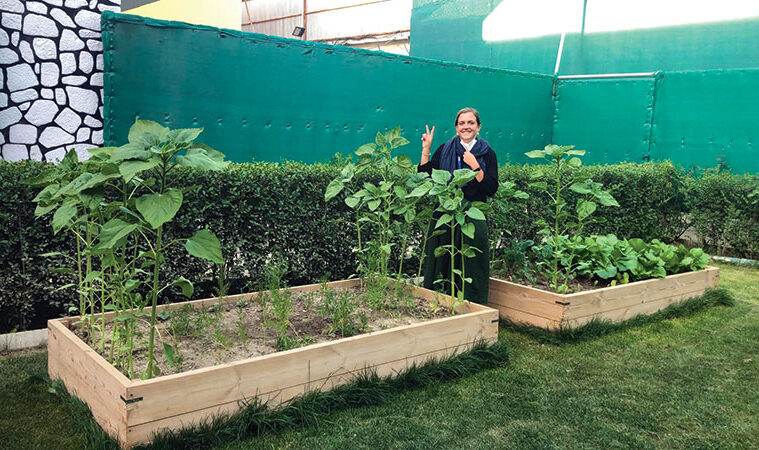As the world watches Afghanistan in the wake of international troop withdrawal, Colgate Magazine asked Susan Price ’16 to provide insight from Kabul, where she is a project development officer for the International Organization for Migration (IOM). (The following are her opinions, not representative of the IOM.)
At Colgate, Price majored in international relations and participated in the Geneva Study Group. That experience helped her to “better understand how international organizations work in practice” and confirmed her desire to work abroad.
She returned to Geneva to earn her master’s, doing thesis fieldwork in Myanmar as the exodus of Rohingya into Bangladesh was unfolding. Price began her career with the UN at the Office on Drugs and Crime and then joined the IOM. Before moving to Kabul in January 2021, she was based in Bangkok, supporting IOM’s Rohingya response.
A grant-writing course through the COVE and Upstate Institute provided a foundation for her work today: “The skills needed to apply for a $10,000 and a $10,000,000 grant are not that different — matching an organization’s needs and operational capacities with the interests and focus areas of different donors.”
Explain the work of IOM in Afghanistan and your role.
IOM provides humanitarian assistance and development-oriented, resilience-building programs. The former includes providing medical care to displaced populations and communities in remote areas and the distribution of shelters to families whose homes were impacted by conflict or natural disaster. We also run transit and reception centers for Afghans who are crossing back into Afghanistan, many of whom return as deportees (from Iran) and/or who come back with very little resources. We provide meals, temporary housing, and reunification of lost family members (particularly unaccompanied children) when possible.
The latter includes community planning and infrastructure development, vocational training and small business development, and supporting communities to plan for and be able to respond to natural hazards, such as floods and earthquakes. It’s designed to be owned and carried forward by the communities, hopefully lessening reliance on international aid over time.
As part of the mission’s Program Support Unit, my role cuts across all areas of IOM’s work, supporting the program managers and senior management to propose new projects to donors. It also includes monitoring and reporting on the progress of current projects, as well as external coordination with other UN and NGO counterparts on joint initiatives.
Talk about the changes you’ve seen during your year in Afghanistan.
Much of 2021 was characterized by heightened insecurity and a deterioration of the conflict. The withdrawal of international troops was more or less cemented by the time I arrived, but back then, there was still the hope that there could be some sort of power-sharing agreement reached through nonmilitary means. This changed when it became clear that the capacity of the Afghan military was not what the U.S. and other countries expected it to be without their direct assistance. With the withdrawal of most international (primarily U.S.) forces, the Taliban was quick to make military progress, and the morale of the Afghan forces dissipated. It became clear the Taliban didn’t need a power-sharing arrangement when they took over several key provinces one after another, often encountering minimal military resistance of Afghan forces. The Taliban concluded their takeover of the country by capturing Kabul on Aug. 15. This is a day I will certainly not forget, and of course, which has had a significant impact on Afghans.
What are the biggest issues facing Afghanistan and its people now?
A few things I think about in my daily work: Afghanistan is on the brink of the largest humanitarian crisis in the world. More than half the population requires humanitarian assistance, and the economic situation is becoming increasingly dire, driving Afghans to undertake risky journeys in the hope of opportunity and greater security elsewhere. This is in combination with Afghans who continue to flee the country out of fear of the Taliban.
Of particular concern is the rising level of starvation and malnutrition, coupled with a deteriorating health system that lost substantial international financial support when the former government collapsed. A significant challenge that was overshadowed in 2021 by the conflict was a severe drought, which slashed domestic food production and undermined rural livelihoods. The current food insecurity crisis will continue to impact the country in the coming years.
While active conflict has by and large ceased, there is the possibility for the further rise of the Islamic State in the country, as well as infighting among factions of the Taliban and various armed groups opposed to the Taliban.
It also remains to be seen to what extent the Taliban will govern in a reformed manner from their tactics in the ’90s. In particular is the question of how the Taliban will proceed in upholding the rights of women and girls, particularly linked to education, employment, and public life.
What are your thoughts on the future of Afghanistan?
My hope is that it finds its way toward fostering inclusive minority ethnic and gender representation at all levels of decision making. The current situation does not reflect this, but let’s see what international pressure does. Also, I hope surrounding countries and the authorities in Afghanistan are able to come together on a platform of increased and transparent regional trade, mitigation of the effects of climate change, and improved resource management (especially water and the wealth of minerals and metals the country sits on). These longer-term issues will become even more pressing and have real-world impacts on a country as vulnerable to climate shocks as Afghanistan and whose natural resource wealth many countries are eyeing with interest.
Price says that one of the unexpected benefits of being in Kabul has been reuniting with one of her closest friends, Ranissa Adityavarman ’16, who is working in Islamabad, Pakistan. “I think we’ve both been surprised that Pakistan is where we find ourselves spending the most time together since leaving Hamilton.”

